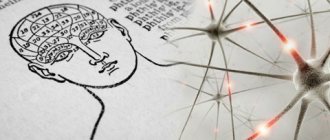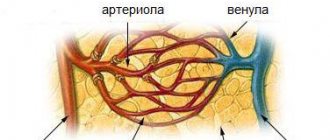Anancastic personality disorder (from ancient Greek ἀναγκαστῶς - “forced”); obsessive-compulsive personality disorder (from the English obsession - “obsession with an idea” and the English compulsion - “coercion”) (outdated name - personality disorder of the anankastic type) - a personality disorder characterized by an excessive tendency to doubt, preoccupation with details, excessive perfectionism, stubbornness , as well as periodically occurring obsessions and/or compulsions. Included in ICD-10 and DSM-IV.
Clinical manifestations
Anancastic personality disorder is characterized by stubbornness, rigid thinking, excessive fixation on details, and recurrent episodes of obsessive behavior. Let's consider these manifestations in more detail.
- Obsessive thinking, re-thinking of events in different forms, analyzing them, drawing conclusions, and thinking again - and so on in an endless circle. Often obsessive thoughts concern everyday moments (whether the tap is closed, whether the iron is turned off). Such thoughts are perceived by the patient as painful, tiring, and he tries to resist them. However, thoughts spontaneously arise again and again.
- The result of such thoughts often becomes attacks of compulsions - obsessive actions to prevent some adverse consequences. In most cases, these consequences are speculative and highly unlikely.
- Both thoughts (obsessions) and the actions accompanying them (compulsions) are difficult for patients to bear; they are perceived as imposed on them; patients often try to fight them and resist them.
- Attention to detail can take a very pronounced form, interfering with life and the performance of professional duties. A person develops his own ideas about quality, often more strict than generally accepted ones. In everyday life, a whole system of housekeeping is developed, with strictly designated places for each thing, allocated time for each task, and a regulated procedure for performing daily manipulations.
- At the same time, it is very difficult to convince a person to change the order he has established. He finds a lot of excuses, reasons why this cannot be done, and if something changes, he may even get sick.
A very clear example of anancastic personality disorder would be Sheldon Cooper from The Big Bang Theory. In this hero one can observe almost all types of rituals and obsessions described in literature.
Symptoms
Anankast personality is not difficult to recognize. Don't remain indifferent. If you see that a loved one is tormented by incessant unnecessary doubts, he constantly double-checks everything, shows excessive caution, and in the process of activity is overly concerned with details to the detriment of the process itself, then it’s time to sound the alarm. Such a person is also hampered by a clear directive: either do something perfectly, or do nothing at all. This stops his life. A person becomes overly obligatory, fixated on his activities to the detriment of the rest of his life.
As a result, an over-pedantic person is afraid to violate social norms and orders and suffers from the fact that he cannot adapt to changing circumstances.
Causes of development of anancaste disorder
Quite varied. There is undoubtedly an influence of genetic factors - in relatives of people with anancastic disorder, the probability of the disease reaches 7%.
Various damaging factors, especially those suffered at an early age, can also provoke the development of anancaste disorder. Most often these are birth injuries or traumatic brain injuries in infancy.
Some people with obsessions show changes in the encephalogram. This suggests the presence of an epileptiform focus of pathological impulses in the brain.
Also, anancastic personality disorder can accompany various mental illnesses - autism and its varieties, manic-depressive psychosis, schizophrenia.
Finally, from the point of view of psychoanalysis, obsessions are a manifestation of suppressed anxiety or aggression.
Jealousy and... greed?
Anancasts usually occupy leadership positions. They are jealous - they feel betrayed when part of their work is entrusted to a more active and flexible person. And if not, how does it all end? A patient with anancaste disorder takes on all the work on himself, and this leads to emotional and moral exhaustion, since this is an unbearable burden. Greed? Rather, the desire to do everything with dignity, in the best possible way. The best. The problem of a perfectionist. Try to praise such a person - he will look ten years younger, he will be so pleased!
But if the anancast stalls, he gets bogged down in details, misses deadlines, and gets fired. As a result, he suffers even more from the fact that he could not do what he should, eats himself, plunging deeper into the disease, leaving society in the wilds of his personality: a vicious circle results.
Diagnostics
The diagnosis is made on the basis of recurrent obsessive symptoms. These symptoms must come from the patient, cause him rejection, a desire to resist the symptoms.
The level of attention to detail is considered pathological if it interferes with everyday life or professional activities.
Obsessive-compulsive episodes are often combined with depression. In this case, the disease whose symptoms appeared earlier or are more pronounced at the moment is considered primary. When obsessions are combined with mental illnesses, the diseases are considered primary and are treated first.
Personality type
Many psychologists identify a special, anancastic personality type, not considering this disorder a disorder, but simply considering it to be a person’s characteristics. But there are psychological schools that consider such behavior and reactions to be deviations from the norm. In any case, if you find similar symptoms in yourself or your loved ones, consult a psychiatrist or first a psychologist.
Both points of view are unanimous in one thing: if a low level of manifestation simply causes increased nervousness of a person and can manifest itself in the form of accentuation (at a neurotic level), then a more aggravated severity leads to deep problems of socialization and is called anancastic psychopathy. Consultations with specialists will not be superfluous in any of the cases; discomfort must be resolved.
Treatment
At the beginning of treatment, it is important to explain the need for therapy and reassure the patient that he does not have insanity, because obsessions are often perceived by patients as its initial manifestations.
Treatment approaches vary depending on the severity of the disorder and the degree of discomfort it causes the patient.
A non-severe personality disorder that does not interfere with professional activities may remain undiagnosed for years and be perceived as a personality trait of the patient. If correction is necessary, psychotherapy methods may be sufficient.
The most commonly used approaches are behavioral therapy and psychoanalysis. Behavioral therapy sessions are aimed at reducing sensitivity to stimuli that provoke compulsions by gradually accustoming the patient to interact with them. The goal of psychoanalysis is to find the underlying causes of obsessions, to help the patient understand and accept them.
Both types of psychotherapy can be quite successful, with more than two thirds of patients becoming free of symptoms of anancastic personality disorder in the long term and almost all achieving significant reduction in the severity of symptoms.
In psychotherapy, it is very important to establish close contact between the patient and the doctor and comprehensive support from the patient’s relatives. On a conscious level, anancasts are always willing to make contact and follow all the doctor’s orders. Difficulties may arise with unconscious resistance to and sabotage of the treatment process.
More severe anancastic personality disorder, close to obsessive-compulsive disorder, requires mandatory drug therapy. The best effect is shown by atypical antipsychotics. Anxiolytics can be used to temporarily suppress symptoms. Monoamine oxidase inhibitors and serotonergic antidepressants are also prescribed.
To treat concomitant vegetative manifestations (sweating, palpitations, shortness of breath), if they are significant, symptomatic medications are prescribed, in particular beta blockers.
The combination of anancastic personality disorder and depression requires the prescription of therapeutic doses of antidepressants, selected individually.
If anancastic disorder is a symptom of any mental illness, the causative illness is treated.
Minuses
Anankast is characterized by an inability to adapt to environmental conditions - rigidity, as well as stubbornness, excessive love of order, laws and rules. This person is obsessed with neatness, goes into the smallest details and sometimes completely insignificant details; he can be called a perfectionist. And all this prevents him from normally completing any of the tasks he undertakes. And they are very afraid of making a mistake, because of this they are indecisive. A person is constantly overcome by “mental chewing gum”: a lot of thinking, but there is no solution to the problem.
Such people are characterized by a high degree of formality, lack of a sense of humor, excessive seriousness, and intolerance.
They are incapable of compromise, but most importantly, they demand from those around them complete submission to the rules of the life they have invented for themselves.
For them, anything that can break familiar stereotypes is alarming and unacceptable, and this anxiety is masked by various rituals. Anankasts often develop completely unacceptable desires.
As a consequence of the disease, people develop anxiety-phobic disorders and obsessive-compulsive neuroses. Is it worth saying that you should consult a psychiatrist for treatment?
At work
Watch your boss. If he cannot and does not want to disrupt the algorithm according to which his work proceeds, he has difficulty delegating authority, and demands that everything be strictly done only as he says, you have a possible anankasta in front of you. There are many of them in leadership positions.
At the same time, he is absolutely sure that he is doing everything correctly, this is the only way it should be, there are no more options. He has pens and pencils lined up on his desk, his monitor stands in a strictly certain place without a single speck of dust, and his keyboard lies at a certain angle. The chief anankast will require, for example, that the numbers in the report appear not on the left or in the middle of the column, but strictly on the right. Lack of understanding on the part of colleagues of such subtleties makes the patient with anancastic disorder angry and refuse to work with such “stupid” employees.
Sources
- https://onevroze.ru/chto-takoe-anankastnoe-rasstrojstvo-lichnosti-prichiny-klinicheskoe-proyavlenie-i-lechenie.html
- https://www.neboleem.net/anankastnoe-rasstrojstvo-lichnosti.php
- https://fb.ru/article/393421/anankastnoe-rasstroystvo-lichnosti-prichinyi-simptomyi-i-lechenie-bolezni
Interpretations
According to psychoanalysts, people with this diagnosis may even be at a psychotic and neurotic level, however, the personality characteristics that are characteristic of this type are preserved. There is currently controversy over whether it is necessary to divide anancastic personality disorder into separate compulsive and obsessive types.
According to experts, the basis of the obsessive-compulsive personality organization is reliance on such protective mechanisms as “isolation of affect,” “reactive formation,” and “omnipotent control.”
People with this disease experience certain difficulties with the emotional sphere of life. Sometimes this makes them look like schizoids. The difference is that the problem of schizoids is to control other people’s emotions and desires, while for anankasts their own experiences and attitudes occupy an important place.
According to psychoanalysts, such personalities are formed in children when parents require them to meet high behavioral standards, as well as “feeling standards.” Since the course of emotional processes is not determined by a conscious choice, the child begins to feel guilty for the lack of ability to control his own desires and feelings.










